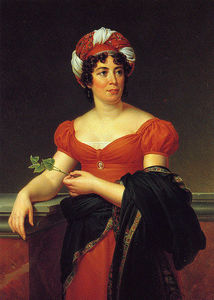Liberty Matters
Madame de Staël on the Liberty of the Moderns

In his latest comment, Steven Vincent mentioned that juridical and constitutional issues remained important for Madame de Staël throughout her entire career. This is a significant point worth highlighting in our conversation. Even if she was arguably less interested (and precise) than Constant in analyzing the concrete mechanisms of representative government, it is important to remember that beginning with the Directory, Staël offered a vigorous defense of what came to be known later as the liberty of the moderns. Today we associate this term with Constant's famous essay from 1819 on the liberty of the moderns compared to the liberty of the ancients.[115] Yet the distinction had appeared for the first time in Staël's writings, two decades earlier. This detail is often neglected by political theorists, and it is time to set the record straight.
To this effect, we should turn our attention to Staël's Des circonstances actuelles qui peuvent terminer la Révolution et qui doivent fonder la République en France (1798), "one of the most representative texts of republican constitutionalism"[116] ever written. It is no mere coincidence that at about the time she was working on this manuscript, two of her closest friends were drafting their own manuscripts addressing similar questions regarding the constitutional and political means for "ending" the French Revolution. Sismondi started drafting his Recherches sur les constitutions des peuples libres in 1797, a manuscript which he completed four years later but which remained unpublished.[117] In turn, Constant examined the possibility of creating a republic in a large state in Fragments d'un ouvrage abandonné (1802). We know that Staël, Sismondi, and Constant commented on each other's drafts and borrowed freely from each other's ideas. A few years later, Constant drafted the first version of his most important political work, Principles of Politics (1806),[118] by revisiting many of the ideas of Staël and Sismondi.
The importance and value of Des circonstances actuelles can hardly be overestimated. In that manuscript Staël argued that "[t]he liberty of present times consists of everything that guarantees the independence of citizens against the power of the government."[119] In modern societies, she wrote, citizens are allowed to freely pursue their self-interest, while in ancient republics, the emphasis was on civic virtue and direct political participation. Ancient citizens were asked to sacrifice their individual interests for the sake of their communities. Such a demand, Staël argued, ceases to be legitimate in the context of modern society, in which it is no longer possible to expect citizens to spontaneously identify themselves with a putative common good. On the contrary, modern individuals ought to be allowed to pursue their own private interests as they think fit. Therefore laws and institutions in modern society should protect property and the private sphere from any form of illegitimate interference from outside.
During the Directory, Staël expressed concern for the low public spiritedness of the French, which she regarded as a corollary of civic apathy engendered by postrevolutionary fatigue and the failure of the Revolution. Understanding and respecting the distinctive nature of modern liberty was, in her view, the only way to end the revolutionary cycle and make representative institutions work in the aftermath of the Terror. "In order to finish the revolution," she wrote in 1795, "one must find a center and a common link.… This center which we need is property; this link is personal interest."[120] Staël's language was anything but Rousseauian. Hers was a bold agenda of reform at the heart of which lay the principle of political moderation, the opposite of the spirit of party she denounced in her writings. Two and a half decades later, Constant followed in her footsteps when he made his own case for recognizing the distinctive nature of modern liberty.
Endnotes
[115.]Benjamin Constant, The Liberty of Ancients Compared with that of Moderns (Unknown, 1819). <https://oll.libertyfund.org/titles/2251>.
[116.] Mauro Barberis, "Constant, Mme de Staël et la constitution républicaine: un essai d'interprétation," in Le groupe de Coppet et le monde moderne: conceptions-images-débats, ed. Francoise Tilkin (Geneva: Droz, 1998), p. 193.
[117.] Sismondi's Recherches sur les constitutions des peoples libres were edited and published by Marco Minerbi at Droz (Geneva) in 1965. The published text represents only the last batch of the entire manuscript, which consists of three other parts. The second part was published in Roberta di Reda ed., Libertà e scienza del governo in Jean Charles Léonard de Sismondi, vol. II: Essais sur les constitutions des peoples libres (Rome: Jouvence, 1988).
[118.] A later and expanded version of this book was published as Benjamin Constant, Principles of Politics Applicable to all Governments, trans. Dennis O'Keeffe, ed. Etienne Hofmann, Introduction by Nicholas Capaldi (Indianapolis: Liberty Fund, 2003). <https://oll.libertyfund.org/titles/861>.
[119.] Des Circonstances actuelles, p. 111.
[120.] Germaine de Staël, Œuvres Complètes de Madame la baronne de Staël publiées par son fils (Paris: Treuttel and Würtz, 1821), vol. I, p. 58.
Copyright and Fair Use Statement
“Liberty Matters” is the copyright of Liberty Fund, Inc. This material is put on line to further the educational goals of Liberty Fund, Inc. These essays and responses may be quoted and otherwise used under “fair use” provisions for educational and academic purposes. To reprint these essays in course booklets requires the prior permission of Liberty Fund, Inc. Please contact oll@libertyfund.org if you have any questions.